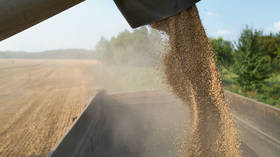
Slovakia is set to establish a licensing system with Kiev for agricultural trade, the news agency reports

© Getty Images / Pierre Crom / Stringer
Slovakia and Ukraine have agreed to set up a new licensing system in order to settle a dispute over grain imports, Reuters reported on Thursday, citing the Slovak Agriculture Ministry.
The decision comes after Kiev filed a complaint at the World Trade Organization (WTO) against Slovakia, Poland, and Hungary. All three countries announced unilateral bans on the import of Ukrainian seeds and grain last week, arguing that they undercut domestic prices and threatened the livelihoods of local farmers.
Earlier this summer, the EU allowed five Eastern European member states, including Romania and Bulgaria, to block the import of certain Ukrainian agricultural products for domestic sale. However, the bloc refused to extend the ban this month. Romania has not applied unilateral measures after the EU measures were lifted, while Bulgaria imposed an embargo on sunflower seeds from Ukraine on Wednesday after days of protests by farmers.
“[Ministers] agreed on creating a grain trade system based on issuing and controlling licenses,” the Slovak Agriculture Ministry said in an email to Reuters. “Until this system is up and running and fully tested, the ban on imports of four commodities from Ukraine remains in place,” it added.
According to the ministry, Kiev has also agreed to drop its complaint against Slovakia at the WTO.
The Slovak ban on imports of Ukrainian wheat, corn, rapeseed, and sunflower seeds was approved until the end of the year. Prime Minister L’udovit Odor previously said that Bratislava had been forced to “prevent excessive pressure on the Slovak market” to remain fair to local farmers.
READ MORE: EU to back members against Ukraine – FT
According to the Financial Times, the European Commission is likely to defend Poland, Hungary, and Slovakia against the complaint filed by Ukraine, despite the three member states going against the EU policy of acting in unison on trade matters.
For more stories on economy & finance visit RT’s business section




